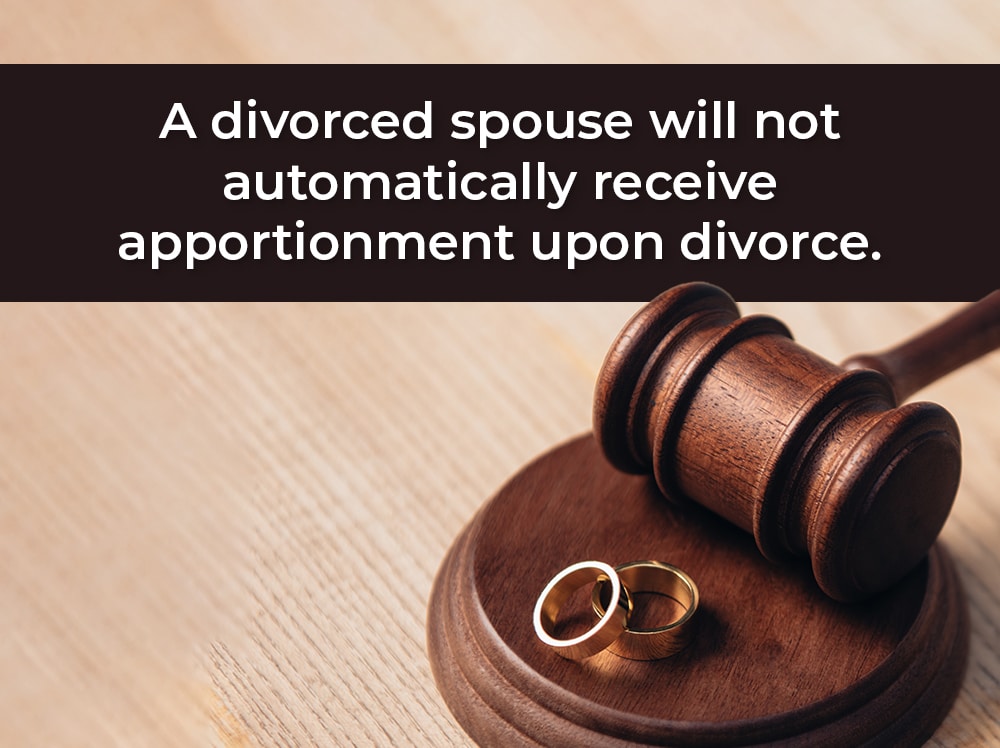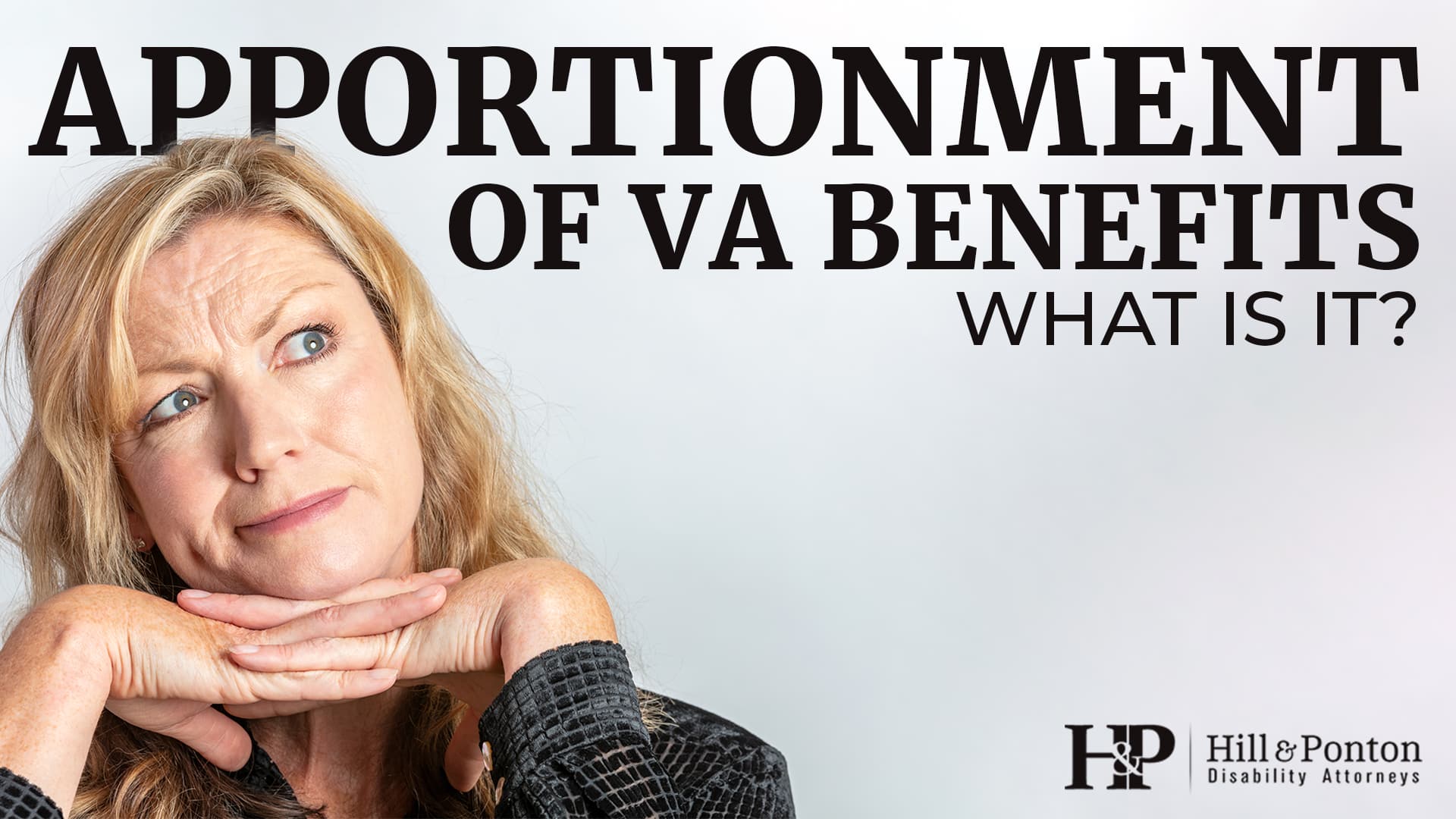Generally, a veteran’s VA benefits may not be paid to anyone other than directly to the veteran. However, if a family member is the veteran’s designated fiduciary or apportionee, the family member may be eligible for receiving payment from the veteran’s compensation directly from the the United States Department of Veterans Affairs.
All or a portion of a veteran’s disability award may be apportioned (assigned) to a veteran’s spouse, veteran’s child, or dependent parent.
The person requesting apportionment must:
1) live apart from the veteran and/or
2) demonstrate a need for benefits, or that the veteran is failing to support a family member for whom the veteran is legally responsible.
The VA may also apportion a veteran’s benefits to a family member if the veteran is incarcerated or if an incompetent veteran is hospitalized without a fiduciary or guardian. To demonstrate need, such factors as the claimant’s income and living expenses will be considered. However, even if these requirements are met, the VA must not impose an undue hardship on the Veteran.

Who Qualifies for an Apportionment?
An apportionment may be paid to:
- An estranged spouse and child
- Children in an estranged spouse’s custody
- A child or children not living with the veteran or surviving spouse and to whom the veteran or surviving spouse is not reasonably contributing, or
- A dependent parent
What Evidence Can Be Helpful for VA Apportionment?
As mentioned above, the VA will require evidence when determining whether apportionment is necessary. The family member or estranged spouse will need to demonstrate financial hardship.
When you apply for apportionment, you will need to fill out VA form 21-0788 called Information Regarding Apportionment of Beneficiary’s Award. The form is available on VA.gov In this form, you will need to provide specific information about your financial hardship. The VA asks for information regarding:
- Income from wages, social security, retirement or annuities, supplemental security income, or public assistance
- Net worth, including bank accounts, retirement accounts, stocks, bonds, mutual funds, property other than your home, and other assets
- Monthly living expenses including rent or mortgage payments, food, utilities, telephone, clothing, medical expenses, school expenses, and any other expenses that apply
It will be wise to keep evidence of this income and expenses on hand for the VA to review. Evidence may include bank statements, pay stubs, receipts for bill payments, and other financial documents. The VA may ask for additional evidence when assessing your entitlement to apportionment, so be sure to be truthful on the form.
If you’re a former service member receiving veteran’s disability compensation as part of your disability benefits, it’s helpful to know that the VA looks for when making a decision on apportionment. Remember that the VA will not award apportionment if it causes financial hardship for the veteran, so you should keep records of your financial need as well, as well as income, retirement pay, assets, and expenses.
Overview of the Apportionment Process
The apportionment process occurs as follows:
- Filing: To file for apportionment of the veteran’s award, the veteran or person wishing to be paid must fill out the VA Form 21-0788, Information Regarding Apportionment of Beneficiary’s Award.
- Evidence Gathering: When the VA receives a claim for apportionment of a veteran’s benefits, the VA must gather evidence and decide whether to award the apportionment claim.
- VA Decision & Notification: Once the VA decides to award or deny the claim, the VA must notify the veteran as well as the person requesting apportionment, if other than the veteran. Included in this notification will be the procedural and appellate rights of each party.
- Appeal (if applicable): If an appeal is filed, the VA will treat the issue as a contested claim and release a statement of the case to both parties. Once the statement of the case has been released, the parties have 30 days to file a substantive appeal.

When Will a Veteran’s Benefits Not Be Apportioned?
A veteran’s benefits will NOT be apportioned under the following circumstances.
- If the total benefit payable is so small it does not permit payment of a reasonable amount to any apportionee;
- To the spouse of a disabled veteran, if a court has found the spouse guilty of “conjugal infidelity;”
- To the spouse, if the VA determines that the spouse of a veteran has lived with another person and held him or herself out openly to the public to be the spouse of that other person (unless that relationship was entered into in good faith because the spouse believed the marriage to the veteran was legally terminated). No apportionment will be made to the spouse unless there has been reconciliation with the veteran followed by an estrangement;
- To a child, if another person legally adopts the child of the disabled veteran (although the additional compensation payable for that child can be apportioned to the child); or
- To a child, if the child is under age 18 and enters active military service. However, any additional amount will be paid to the veteran until the child’s 18th birthday unless the child is included in an existing apportionment to an estranged spouse.
How Does Divorce Affect VA Apportionment?
Each state has its own laws concerning divorce, alimony, and child support, however, there are federal laws which provide protections to the benefits of veterans. The Uniformed Services Former Spouses’ Protection Act states that VA disability compensation is not considered marital property and therefore is not subject to property division within divorce proceedings.

Depending on the veteran’s specific state laws, the VA disability compensation may be subject to child support and even alimony. Nevertheless, a divorced spouse will not automatically receive apportionment upon divorce. The spouse must apply and the VA will assess the evidence of whether it is appropriate to apportion the veteran’s compensation benefits. If the veteran has dependent children within the custody of the divorced spouse, after assessing whether it is justifiable to apportion the benefits, the VA will pay the apportioned benefits directly to the dependent children.
To learn more about how divorce affects apportionment, view your state’s specific family law statutes. Overall, it is important to take away that if a veteran gets divorced, his or her benefits will not automatically be apportioned; the divorced spouse or dependent children must apply and go through the VA apportionment process.
It is important to review all documents received from the Department of Veterans Affairs to keep track of your benefits, your dependent benefits, and whether any dependent has made a claim for a right to apportionment.


